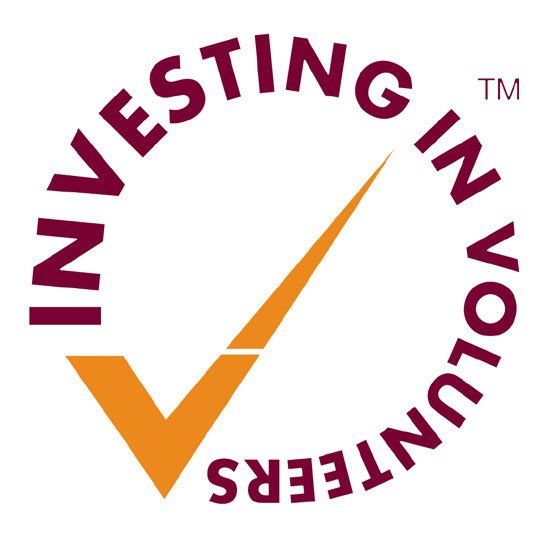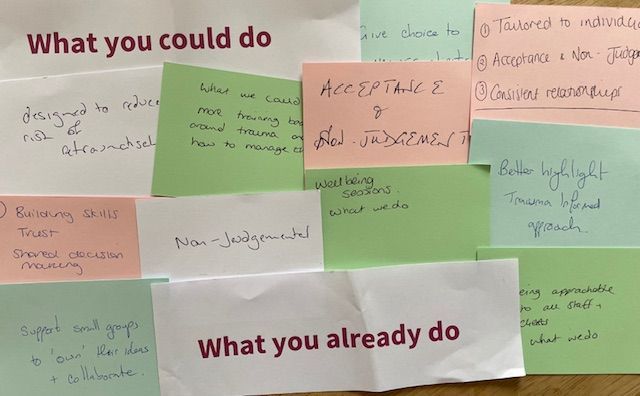How can you involve volunteers successfully in developing and delivering your strategy?
The involvement of volunteers can be the difference between success and failure of your mission, but doing this effectively is an area in which some organisations struggle. Based on experience as an Investing in Volunteers assessor, this post sets out what some of the common problems are, what volunteers bring to delivering the organisation’s objectives, and some suggestions about the practicalities of involving volunteers successfully.
The Investing in Volunteers standard
Investing in Volunteers has been updated since I first wrote this blog, and the links between volunteers, strategy and impact strengthened, but many of the principles of good practice remain. Indicators relating to this include:
Quality area 1: Vision for volunteering
Volunteering is embedded within the overall vision, values, culture and aims of the organisation and its impact is recognised and communicated. Organisations understand why they involve volunteers
- 1.1 Volunteering is planned and reviewed in line with the organisation’s vision, strategy, and values
- 1.2 Volunteering is valued as part of the culture of the organisation and the benefits of volunteering are understood and communicated
- 1.3 The impact of volunteering in contributing to organisation aims is understood and communicated
- 1.4 Volunteer involvement is reflected in management, financial and resource planning
Volunteers feel supported at all times, that they are a part of the organisation and that their contribution makes a difference
- 5.3 Volunteers have the opportunity to discuss how they are doing - this links in to how their activities are helping to meet the organisation's objectives and was added to the latest version of Investing in Volunteers
as we found that sometimes volunteers would say that they had carried out an activity (e.g. surveying patients in a hospital, or reporting damage to countryside rights of way) but no one got back to them to tell them what had happened as a result of their activity.
- 5.4 Volunteers have opportunities to express their views and ideas and to be involved in relevant decision making
Volunteers are valued and there are opportunities for volunteers to develop and grow through their experience
- 6.1 Volunteers feel their contribution is meaningful and rewarding - again, this links to feeling that they are part of something that is making a difference and is related to volunteers' intrinsic motivations - why they are involved in the first place.
- 6.2 Volunteers feel valued by and a part of the organisation - this is more about external validation, someone has noticed their contribution, which includes noticing how they have helped the organisation to deliver it's objectives. A specific thank you is often more meaningful than a general thank you.
Common gaps in volunteers' involvement
These include:
- Strategies and plans mentioning volunteers but only as an input or resource and not including them in the outcomes / objectives / action planning sections.
- Not mentioning volunteers at all.
- Not involving volunteers in the review of services or development of plans.
- Not being clear with volunteers and staff what volunteers contribute to delivering the strategy.
- Not providing the systems, structures or resources necessary for volunteers to undertake their roles, including not linking volunteer managers sufficiently into management structures.
- Not involving volunteers or volunteering measurements in reviewing progress.
- Not linking volunteer managers into the planning process.
- Not feeding back to volunteers what difference their specific involvement has made.
- Not recognising volunteers' unique roles in being close to people accessing services, the community or environment.
- Not knowing how to measure volunteers' impact beyond number of hours or financial value calculated on the basis of minimum / living / average wage.
Being clear about what volunteers contribute
When asked what volunteers bring to organisations, as well as the obvious added capacity, common answers are:
- A range of skills, knowledge and experience to deliver the strategy that the organisation wouldn’t otherwise have, from life and professional perspectives.
- Connections to the local community, geographically or specific groups of people to broaden an organisation’s reach and help beneficiaries feel the organisation is “for them”.
- Bringing a wider range of voices into the organisation to provide fresh ideas or challenge to existing practice to help with innovation and developments.
- Improving outcomes for beneficiaries. Volunteers have the time to spend with clients to build relationships and to meet emotional needs see How can volunteering improve health outcomes? for more information about some research on this in the health field.
- They are someone who interacts with clients “without a clipboard” as one service user said to me, who can focus on the client’s needs and build an emotional connection without a particular agenda.
- Volunteers help beneficiaries to feel valued and important. It is meaningful to people that someone is giving their time freely rather than being paid to be there – to some this is an unknown concept.
How to involve volunteers in strategy
There are various steps that you can take, many the inverse of the gaps:
- Involve volunteers in research about your beneficiaries’ needs and evaluation of your services . Volunteers can often be the people in your organisation with most time to speak to people accessing services or the wider community and may be told things that staff do not get to hear. They also provide a wider reach into your local community. This can be through ensuring you have mechanisms to ask volunteers through to involving volunteers as community researchers with a specific role to find out what people need or think about your services.
- Set up mechanisms to hear volunteers’ voices For some this is about involving volunteers in existing staff structures such as team meetings or awaydays, for others it’s about having a volunteer steering or advisory group, or volunteer forum.
- Enable volunteers to feed into the development of your plan. This may be by involving volunteers in a strategic planning or leadership group through to giving volunteers the opportunity to comment on a draft plan. Let people know the contribution that volunteers have made to the plan and what has been adopted or rejected in the development of the plan.
- Ensure that for every strategic objective in your plan you have identified whether and how volunteers contribute towards this (where relevant). Make it clear in the plan what volunteers’ roles are and be specific about how it will be delivered and what resources are required to support delivery – some of the more detailed information may be in an action plan or service- or team-level plan.
- Communicate inside and outside your organisation what volunteers bring. This can be through staff meetings, training, individual meetings, articles or case studies on your website, newsletter or intranet, social media, or any other mechanism you use to communicate.
- Consider how volunteers delivering services relate to the governance of your organisation. You could involve service delivery volunteers as trustees, have a trustee/trustees on the board with specific responsibility for liaising with volunteers, make a volunteer steering group a part of the board structure, or hold shared meetings and activities.
- Involve volunteers in the regular review of your strategy throughout the planning cycle.
- Ensure that your volunteers are well managed and get training, support and recognition. Investing in Volunteers can help you to review your volunteering practice and highlight the voice of volunteers to identify what you do well and what you can improve. You can get a free, no obligation quote.
- Recognise the crucial role of volunteer managers. They are likely to have a huge amount of expertise in relation to what does and doesn’t work and are vital in working directly with the volunteers to ensure that your strategy is a success.
How can Ideas to Impact help?
Ideas to Impact can help you with all aspects of the process of
involving volunteers in your strategy: working with volunteers to get
their views and ideas about what works, involving volunteers in the
planning process, supporting setting up steering groups or volunteer
forums, reviewing your existing processes to identify strengths and
areas for improvement, writing policies and procedures, facilitating
meetings, holding good practice workshops, and coaching and mentoring. Help can also be provided with research, impact assessment and evaluation. See the training and services
page and particularly the volunteering section
for more activities.
Get in touch for a discussion using the contact form
or through becky@ideastoimpact.co.uk











